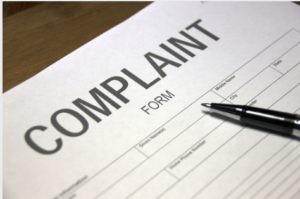Managing Complaints
Managing Complaints
Managing complaints is tough and there seem to be a lot of them. Sadly, people don’t reach out just to say, ‘thank you, great job!’ As a clinical supervisor and externship coordinator at a University, I hear more of what isn’t going well than what is. There are even websites where disgruntled students can lash out at professors anonymously. 😕
Complaints can be hurtful, especially when they feel like a personal attack. 💣 Like most people, I don’t like criticism and wish I could avoid it. After all, does anyone like criticism? However, criticism is just as common as breathing. No matter how much time and effort you put into something, there will always be someone who has a negative comment.
Everyone has an opinion, or critical comment when they aren’t doing the work. It’s so easy to sit back and say, ‘this is how it should have been done.’ Teddy Roosevelt said it best with
The Man in the Arena:
“It is not the critic who counts; not the man who points out how the strong man stumbles, or where the doer of deeds could have done them better. The credit belongs to the man who is actually in the arena, whose face is marred by dust and sweat and blood; who strives valiantly; who errs, who comes short again and again, because there is no effort without error and shortcoming; but who does actually strive to do the deeds; who knows great enthusiasms, the great devotions; who spends himself in a worthy cause; who at the best knows, in the end, the triumph of high achievement, and who at the worst, if he fails, at least fails while daring greatly, so that his place shall never be with those cold and timid souls who neither know victory nor defeat.” -Teddy Roosevelt
Possible reasons why someone is complaining
When you hear of a complaint or criticism, the first emotional response is probably ‘how dare they.’ That is a normal response! However, after the hurt and anger subside, it’s important to think about some of the reasons behind complaints. Most of the time it isn’t personal. Below are a few reasons why someone might complain or criticize another person, action, or decision.
They feel hurt:
Sadly, some people take out their anger or frustrations on others. If they can bring others down, they feel better about themselves
They are trying to save face:
Some people can’t take responsibility for their actions and want to throw someone under the bus to make themselves look good (are you noticing a pattern here already?)
Expectations are wrong:
Some people have expectations that just aren’t realistic. In my job, I have students who want both very specific clinical experiences and a short commute (don’t we all want a short commute!). There is one problem; I can’t create clients or externship placements out of thin air. Externships aren’t required to take a student every semester and clients certainly have the right to stop services at any time. We can only place students where is availability
Unsure of your role
I see this a lot in my line of work as a clinical supervisor. We can only do so much in setting up placements, scheduling clients, and providing clinical experiences. Most of the complaints I receive about externship placements would take the whole department, or even University, to make policy changes because of all the factors that go into decisions

How to Manage Complaints
As much as you want to be angry with a complainer, and maybe even get on their level, the person on the receiving end often has to be the bigger person. I can say that it gets easier over time and the faster you are able to overcome the initial emotional response, the faster you can get to the real issue (and a solution)
Consider the source:
Is the person a chronic complainer? Do they have something to gain from making you look bad? Like a student who has received a bad grade because they didn’t study and want to blame you for being a harsh grader? Or a colleague who wants to make you look bad? Or an individual who made a mistake and doesn’t want to accept responsibility? Those negative nellies will never change. Their glass is always half empty
Talk about it:
Most hurtful comments are thrown out there in anger with the expectation that the person being discussed will never hear it. However, sometimes it does get back to that person. If you are comfortable, confront the person who said the comment in a professional way
Explain your rationale:
It’s easy for people who aren’t in the arena to have an expectation about how things should be done. Also, hindsight is 20/20. Take time to explain your rationale of how you came to a decision with the resources you had at the moment. Most likely, the complainer didn’t consider all angles
Be open-minded:
While complaints suck, sometimes there are suggestions hidden in them, like a little gem that we can actually use. When possible, turn lemons into lemonade and use that hidden gem to make something better next time. At the very least, you can students up with clearer expectations
Give compliments:
Not to the negative nellies who try to tear you down to feel better about themselves but to people out there who deserve it. Put more kindness into the world, we all need it!

What are the most outlandish complaints have you heard? How do you manage complaints? Let us know in the comments below.

